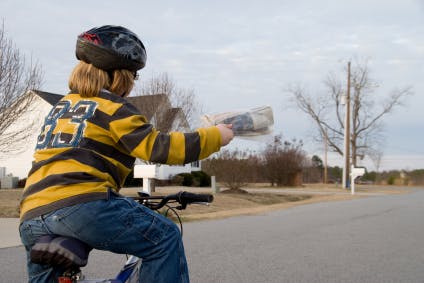A couple nights ago, dinner was interrupted with a knock on our door. We don’t get many knocks on the door (at least without some warning from visitors) so it is always a bit surprising.
A 13 year-old who I had seen around the neighborhood before handed me a copy of our local paper and went right into a pitch for getting a newspaper delivered to our house. I listened to him intently for a minute and told him typically view the news online. I expected the short sales pitch to end at that point.
But here he was continuing his pitch and telling me they had an e-edition of the paper that I could get through him for an exclusive discount. He loaded up all of the features for me (but I did stump him on the question about iPad compatibility). I asked him how often he came through the neighborhood because I would like to know that before subscribing. He said he would be back later in the month.
Although we didn’t strike a deal at the time, it made me remember my first job and how it prepared me for the working world.
My first job: Paperboy
When I was a kid, I had a paper route too. Every afternoon after school and early mornings on Sundays would be consumed by either banding or bagging newspapers, loading them into my bags, and then riding or walking the neighborhood. A couple times a month, I would go back through my route to collect money that wasn’t sent in to the newspaper.
Every other month, I would have to spend one week after my route to go door-to-door to non-subscribers to see if they were interested in subscribing to the paper. Unlike a lot of kids, I enjoyed this task but it wasn’t easy. The only training we had is how to figure out what parts you target and how to sign them up.
There wasn’t any training on how to sell or how to overcome objections. I was out there on my own. I would get rejected or not be able to close a sale and I would learn. I learned the difference between talking to parents, single people, men and women about what was important to them about the paper.
Obviously the newspaper has changed since then (probably due to a little more competition) and they’ve done some training, but the importance of it cannot be overstated. I was pushed out of my comfort zone, accountable for sales, collecting, and even saving money so I could pay expenses.
The importance Of first jobs
The job was a lot of work, but it was also rewarding. It was the first time I got paid outside of the home. When I got stiffed by a customer, I was the one who had to follow up and get the money I was owed.
Of course, I think about the fact that teen employment rates are at historical lows and wonder if it is going to change the preparedness of our workforce? There are many criticisms of youth employment including points about the reduced focus on school work or exploitative working conditions for teens desperate for cash. Laurie Ruettimann posted about this saying:
We have a young cousin, Eli, who mowed lawns all summer long. He earned $5/lawn because that’s the going rate for kids who are eleven and can’t negotiate. He worked hard, saved his money, and he bought a new PS3. Then he spent all Christmas Day telling us about his new games, the awesomeness of the system, and why PS3 is better than oxygen.
And:
I babysat for $2/hr. Then I made $2.35/hr (illegally) scooping ice cream. I could’ve made more money doing a million other things, I suppose, but these two activities suited me well.
In any case, it’s still rough out there for a kid. In retrospect though, I think that these things have helped me prepare for my career. Maybe they aren’t major pieces of our career but they still impact how you grow and develop into your career.
I wonder what a world without that experience would be like? Would that be good or bad for the next generation of workers?
